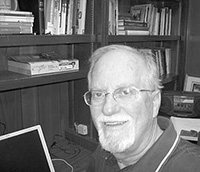At times in our lives, and often in places too far removed from our world to impact our personal well-being, events of tragic proportions happen — and they make all else seem less important by comparison.
 Don Kirkland
Don KirklandSuch is the situation in Haiti, a poverty-ridden island whose residents have seen the little they possessed reduced to nothing.
As the deadline for this edition of The Baptist Courier approached, the magnitude of the earthquake and aftershocks that left horrifying devastation in their wake still was unfolding.
By the time you read this Commentary and other coverage of the Haiti disaster in the Courier, the scope of this catastrophic event will be even clearer and more heart-rending for that reason.
As I wrote this piece on the morning of our publishing deadline, the Red Cross was predicting that as many as 45,000 to 50,000 people had died. One news report said that there is not enough space in the graveyards of Haiti to bury the victims.
I read also that the Haitian prime minister and the consul general to the United Nations have estimated that as many as 100,000 people may have died in the earthquake.
The Red Cross predicts that a third of the Haitians — some 3 million people — were affected by this 7.0-magnitude earthquake.
In this, or any natural disaster, it is almost always the poor who endure the most suffering. Then again, it is always difficult for poor people, whose lives are characterized by constant insecurity and risk.
Haiti is the poorest country in the Western Hemisphere with an average wage of no more than $400 per year. The Haitians, with few resources for recovery, still have struggled to come back from four catastrophic storms in 2008 — and now this.
It also is true that tragic events such as this bring out the best in people around the globe. It is easier, it seems, for citizens of the world to lay aside — at least for a while — some of the differences that divide us in united efforts to support the victims and their families, especially for people who are not strangers to hardship, poverty and sorrow.
As I watched early reports of the earthquake on CNN, I thought: Southern Baptists, South Carolina Baptists will be there soon to help.
And efforts are underway at the national and state levels of denominational life to assess the needs and respond to them. Cliff Satterwhite, the director of the disaster relief group of the South Carolina Baptist Convention, said in a news story in this edition of our paper that relief efforts over the next two weeks will be “fluid,” that volunteers will go to Haiti later, and that for now South Carolina Baptists can help most by giving money to aid the victims. “Money will be the key,” he said.
I read that, while they were camped for the night in St. Pierre’s Plaza in Port-au-Prince, some of the earthquake’s survivors sang a hymn that contained this line: “God, you are the one who gave me life. Why are we suffering?”
Christians and others will continue to wrestle with the question of human suffering, which can appear cruelly random and unfair.
This much I am certain of: Although it is obvious that God permits evil to exist in the world for now, he is never — and could never be, due to his character — the cause of it. In the Haitian tragedy, God is among the poor people of that ravaged country, joining them in their suffering. He is joined by Southern Baptists, by South Carolina Baptists.
We can take justifiable pride in, and give thanks for, the benevolent spirit of Southern Baptists and other believers. Our witness to the world is never more eloquent than when we rally to the side of the hurting and show our love and compassion in imitation of, and in obedience to, the one who “went about doing good.”